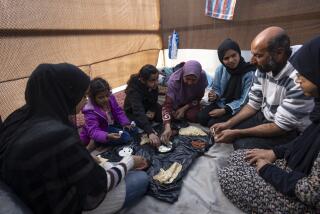Young Egyptian workers are baked hard over a kiln
- Share via
HELWAN, EGYPT — Boys with grit in their eyes and rags on their hands load bricks in the blurry heat of the kilns, waiting for donkey carts, whips snapping the air, to carry the baked stacks away and deliver raw ones from long rows in the sun.
Nasser Mohammed never went to school, saw no need. He’s 16, spends 10 hours a day smearing wet clay on bricks to keep them from splintering while they cook. He is coated in clay. It hardens in the heat, making him seem like a statue that might crack, but he doesn’t, he just dips his hands into more clay, wet again and dripping, smearing another stack. The stacks keep coming.
On his day off, he washes his clothes. They are ripped and singed. He says he’d like to buy some land, build a house, maybe along the Nile, but that doesn’t seem likely for a boy who earns $3.60 a day and whose weekly luxury is going to the butcher to buy a cow stomach to eat with his family. It’s muck and dirt, not dreams, that make life in the kilns.
“You have to master my job,” he says. “If I don’t lay the bricks just right over the oven, someone could fall through into the flame.”
Drive south from Cairo, take a ferry over the river, past kids fishing with sticks and string, cross cornfields and follow the smokestacks, and you can find boys like Nasser. Hundreds of them baking, stacking, hauling bricks; some come from far away, some from just down the road. They live in company-built brick huts with straw roofs, sleep on plastic and couldn’t tell you about the news or the latest music video. They have no TV. At the end of the day, there is shower, night and sleep.
Not everyone’s young. Emad, he would only give his name as Emad, has been here 15 years. He counts bricks. He was in the military, and then was a carpenter, but one day wood prices went up and then never came back down so he closed his small shop and made his way to the kilns. He is 50; he has white, bristly hair and wears a tunic and is convinced that a man in Egypt doesn’t rise beyond his raising.
“This country leaves you with no choices, you end up with what you find,” he says.
The kiln boys are too young to know this, but they’re beginning to figure it out.
Something has hurt the construction industry. The factory boss says business is down 40%; he blames it on inflation and the government of President Hosni Mubarak.
The boys don’t pay attention to politics; they just know that brick stacks sit longer in the sun these days before they’re sold. Even the earth has changed. There’s less silt along the banks of the Nile, and now the soil to make bricks is trucked in from far away and dumped in mounds.
Talat Kamal is 33. He stacks bricks, five at a time, moving so fast the bricks seem weightless. His wife and two children live in the next province over. He sees them on weekends, when he brings what he has saved from his $5.45-a-day job. His wife’s expecting another child, and Kamal, a cloth draped over his head to block out the grime and the heat, has signed up to be a soldier, but so far has not heard back from the army.
His fingers are thick, battered and nicked. That is the mark of the men and boys here; hands as hard and coarse as the bricks they make, and faces splotched with sweat and dust, and, sometimes, blisters.
It’s like a storm out here along the Nile; dust blowing, smokestacks filling the sky with white and gray, boys racing donkey carts through the dirt, bricks slapping, truck motors gurgling, the conveyor whining and spinning and, in the distance, a speck of clear where farmers bend in rows beneath the sun.
Mahmoud Ali is 16; seems like every boy here is 16, even the ones who look 12. His cart is empty, the reins to the donkey slack in his hands. Back and forth, one way empty, one way full. That’s his day. One day he’ll be 33. Like Kamal.
“I quit school. I didn’t like it,” he says. “But I don’t like this either.”
Mahmoud cracks his whip and is off.
These boys don’t talk long when they do talk. Words are energy, and there’s only so much of that to go around. But an occasional diversion is nice; maybe a chariot race with the donkeys, or a car pulling up with a stranger, or a boat of tourists sliding past on the Nile.
“I want a job that will keep me clean,” someone says, and the boys laugh.
It’s 1 p.m. There will be beans and bread for supper, but that’s a long way off; there’s a lot of day to go yet. Nasser’s 9-year-old sister, Inas, carries a tin pot of water for the boys through the heat. A truck arrives. There’s loading to be done.
Nasser smears his clay. He’s baked enough bricks in two years to build a few city blocks. He walks barefoot over the kiln, gray and blurry in the heat, coated in drying clay, like a ghost in the sun, just like the boy down the row stoking bricks with a rod, wisps of smoke rising around him.
--
Noha El-Hennawy of The Times’ Cairo Bureau contributed to this report.
More to Read
Sign up for The Wild
We’ll help you find the best places to hike, bike and run, as well as the perfect silent spots for meditation and yoga.
You may occasionally receive promotional content from the Los Angeles Times.







